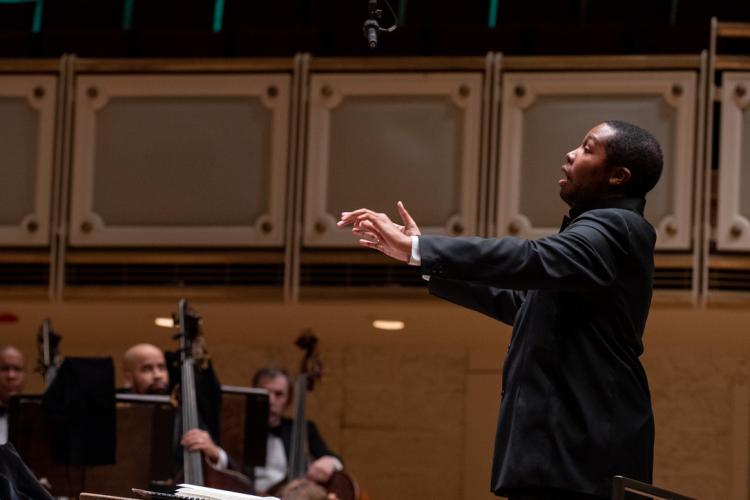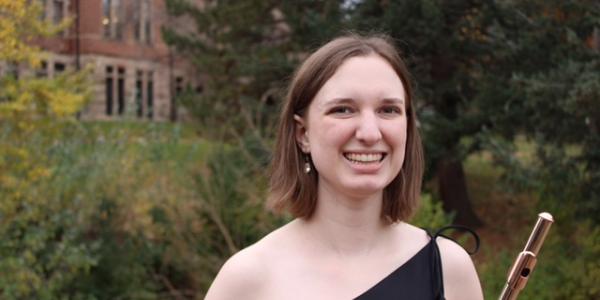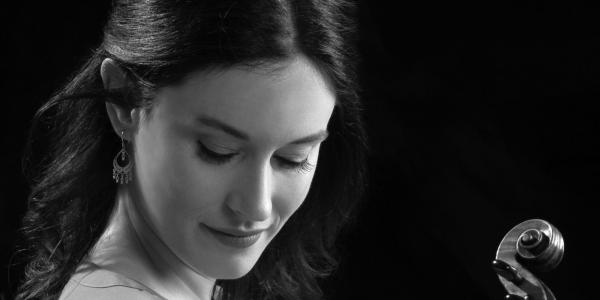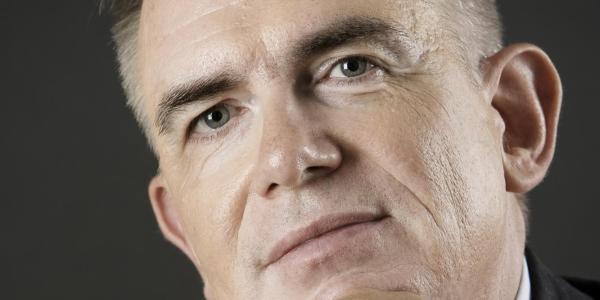“I was so happy with CU’s commitment to diversity.
I’ve seen that reflected in so many ways. It’s been instilled in their program and is in the foreground.
It’s important for schools to dig in as innovators and leaders in preparing musicians.”
˜Kedrick Armstrong
Recently, The Washington Post published an article that listed “22 composers and performers to watch in 2022.” The list of classical musicians included two CU Boulder College of Music students: Kedrick Armstrong, a first-year master’s student in orchestral conducting and composer Anthony Green, who attended the Doctor of Musical Arts program from 2008 to 2012.
The list “represents a diverse variety of composers, performers and artists hitting their stride with work that resonates with the right-now,” classical music critic Michael Andor Brodeur wrote in this Jan. 22 Post piece.
 A young conductor takes up the baton
A young conductor takes up the baton
Armstrong, 27, has recently guest conducted with the Chicago Opera Theater, the Knox-Galesburg Symphony, the Chicago Sinfonietta and the Chicago-based RIZE Orchestra.
In its profile, the Post noted that Armstrong had “taken a lead role in confronting issues of diversity in classical conservatory curriculum.” An open letter Armstrong wrote in 2020 to the Wheaton College Conservatory of Music garnered nearly 1,000 signatories and “led to sweeping changes to concert repertoire,” according to the profile.
Driven to learn more about music created by Black composers, Armstrong discovered the Helen Walker-Hill collection housed in the American Music Research Center at CU Boulder. Professor Walker-Hill was an author of books on Black female composers and had amassed a collection of their works.
“I was immediately drawn to this music because much of it in the archive had not been published, performed or recorded,” Armstrong said. “I became obsessed with these composers and their music. That led me to enroll at CU.”
Armstrong was working full-time in Chicago as a church music director and freelance conductor. In the wake of the murder of George Floyd and the resulting unrest, he felt compelled to examine his music education and saw a lack of diversity in what he had been taught. He was driven to re-educate himself to try to learn about the music of people from various racial and ethnic backgrounds.
“I made the decision to pave the way for future students so they can know there is this deep and rich legacy of these composers and performers,” he said.
Armstrong knew he wanted to be a musician from a young age. His early experience came in the churches of South Carolina, where he played gospel music. As he grew up, he attended music schools and summer music camps and found his focus shifting to classical music. Along the way, his gospel identity fell by the wayside.
“A lot of that part of myself got lost during my years of formal studying,” he said. “I felt far removed from who I was as a young musician. But from my research, I learned there is a rich diversity of Black composers and musicians in classical music, and that really started driving the question of: Why wasn’t I taught about them as I grew up? It lit a fire in me to find a way to give a voice to something I didn’t realize I had when I was in school.”
Armstrong continued, “I was so happy with CU’s commitment to diversity. I’ve seen that reflected in so many ways. It’s been instilled in their program and is in the foreground. It’s important for schools to dig in as innovators and leaders in preparing musicians. While there is still work to do, CU is doing an amazing job.”
After earning a bachelor’s degree in music history, he began applying to schools for conducting opportunities. He was turned down everywhere he applied because he was told he was “too young and inexperienced.”
But his energy and fortitude opened doors for him. Eventually, he found an opening at DePaul University’s Opera Theatre and will lead a production of Leonard Bernstein’s Candide there this June. He’ll also be making his subscription debut with Lyric Opera of Chicago next season.
“I made the best of the opportunities I’ve been given,” he said. “I feel like the happiest boy in the world sometimes.”
 Inspired by Motown + mathematics
Inspired by Motown + mathematics
The Post's article noted that Anthony Green, too, had “taken a lead role in confronting issues of diversity in classical conservatory curriculum.” It described Green, 37, as a “prolific composer and multidisciplinary artist” and “a dynamic and unpredictable composer” who “uses music to investigate art and history and challenge existing models.”
“This mention in the Post feels like an affirmation,” Green said. “The way I lead my career is to use whatever opportunity I get to try to help other people. Particularly young black composers and young queer composers. What the article meant for my career is hopefully to continue this work of helping others and bringing awareness and social justice to classical music.”
In 2013, Green co-founded Castle of our Skins, a Boston-based concert and education organization centered on Black artistry, where he is the associate artistic director and composer-in-residence. Through his work and research with this organization, he came to a musical and personal epiphany about the contemporary world of classical music.
“As soon as we can overcome these antiquated, outdated and niche methods of education and performance, then we can bring this greater message to everybody that music is music,” he said. “And this music is not exclusionary.”
After finishing his master’s degree, Green applied for an ATLAS fellowship in the Doctorate of Musical Arts program at CU. When he came to Boulder for the first time and met the faculty, Green was happy to learn they were “eclectic and experienced,” and he felt he could thrive at CU.
When Green was in kindergarten, his teacher would play melodies on an old upright piano. Green watched his hands and carefully listened to the notes and then would play the melodies himself. From a young age, he was exposed to a wide variety of styles of music based on the tastes of the music people around him were listening to. Living in Providence, Rhode Island with his mother and brother, Green heard gospel and easy listening music. His older brother’s tastes gravitated to neosoul, rap, hip-hop and R&B, and some of Green’s close high school friends introduced him to alternative rock, heavy metal and pop. In the summer, he and his brother would visit their father in Arlington, Virginia, where he would listen to Motown, funk and jazz.
Green has many works and engagements in progress. He has been performing and teaching internationally in places including New York and Kenya. And he has taken advantage of opportunities in Vienna, Prague and Berlin.
In February, the Artaria String Quartet along with string players from Walker West Academy premiered his composition “Joy Diptych” in Saint Paul, Minnesota.
Over the last year, Green composed a concert-length piano sonata that centers on the life and legacy of author James Baldwin. Commissioned by pianist Jason Hardnik, who will perform the premiere in Salt Lake City in March. A second performance in June will happen in Rhode Island, the home state of both Green and Hardnik. This concert was partly funded by Green’s second piano teacher, Dr. Donald Rankin.
In the fall, the Left Coast Chamber Ensemble in San Francisco will perform a new chamber opera titled Tenderhooks. Using an adult comedic libretto by Mark Labowskie, Tenderhooks is an examination into how periods of isolation during a pandemic can cause people to confront themselves and become painfully aware of certain negative mindsets and behaviors.
“I work with visual artists, movement artists, spoken word artists, culinary artists, historians and designers,” Green said. “My focus is Black artistry through music.”
Green likens his creativity as a faucet with a constant flow of ideas that rarely turns off.




